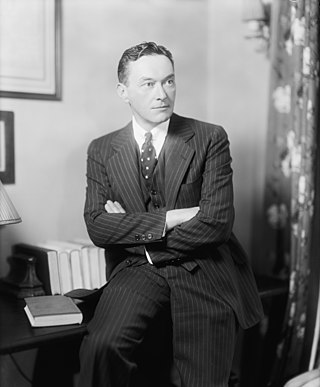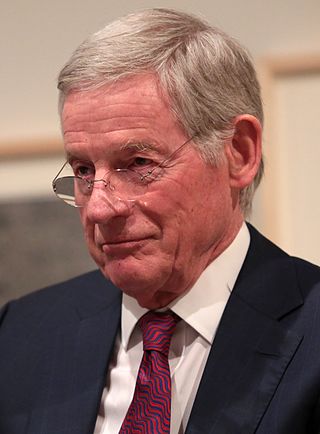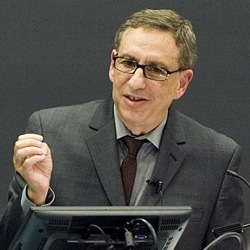Related Research Articles

Democracy is a form of government in which the people have the authority to deliberate and decide legislation,or to choose governing officials to do so. Who is considered part of "the people" and how authority is shared among or delegated by the people has changed over time and at different rates in different countries. Features of democracy often include freedom of assembly,association,property rights,freedom of religion and speech,inclusiveness and equality,citizenship,consent of the governed,voting rights,freedom from unwarranted governmental deprivation of the right to life and liberty,and minority rights.

Walter Lippmann was an American writer,reporter and political commentator. With a career spanning 60 years,he is famous for being among the first to introduce the concept of the Cold War,coining the term "stereotype" in the modern psychological meaning,as well as critiquing media and democracy in his newspaper column and several books,most notably his 1922 Public Opinion.

Democratization,or democratisation,is the transition to a more democratic political regime,including substantive political changes moving in a democratic direction. It may be a hybrid regime in transition from an authoritarian regime to a full democracy,a transition from an authoritarian political system to a semi-democracy or transition from a semi-authoritarian political system to a democratic political system.

Jacksonian democracy was a 19th century political philosophy in the United States that expanded suffrage to most white men over the age of 21,and restructured a number of federal institutions. Originating with the seventh U.S. president,Andrew Jackson and his supporters,it became the nation's dominant political worldview for a generation. The term itself was in active use by the 1830s.

Liberalism in Iran or Iranian liberalism is a political ideology that traces its beginnings to the 20th century.

Comparative politics is a field in political science characterized either by the use of the comparative method or other empirical methods to explore politics both within and between countries. Substantively,this can include questions relating to political institutions,political behavior,conflict,and the causes and consequences of economic development. When applied to specific fields of study,comparative politics may be referred to by other names,such as comparative government.

Barrington Moore Jr. was an American political sociologist,and the son of forester Barrington Moore.

Theda Skocpol is an American sociologist and political scientist,who is currently the Victor S. Thomas Professor of Government and Sociology at Harvard University. She is a highly influential figure in both sociology and political science. She is best known as an advocate of the historical-institutional and comparative approaches,as well as her "state autonomy theory". She has written widely for both popular and academic audiences. She has been President of the American Political Science Association and the Social Science History Association.

The University of Virginia School of Law is the law school of the University of Virginia,a public research university in Charlottesville,Virginia. It was founded in 1819 by Thomas Jefferson as part of his "academical village" –which became the University of Virginia –where law was one of the original disciplines taught. UVA Law is the fourth-oldest active law school in the United States and the second-oldest continuously operating law school. The law school offers the J.D.,LL.M.,and S.J.D. degrees in law and hosts visiting scholars,visiting researchers and a number of legal research centers.
James R. Stoner Jr. is Hermann Moyse Jr. Professor and Director of the Eric Voegelin Institute in the Department of Political Science at Louisiana State University. Stoner specializes in political theory,English common law,and American constitutionalism.

Harvey Claflin Mansfield Jr. is an American political philosopher. He is the William R. Kenan Jr. Professor of Government at Harvard University,where he has taught since 1962. He has held Guggenheim and NEH Fellowships and has been a Fellow at the National Humanities Center;he also received the National Humanities Medal in 2004 and delivered the Jefferson Lecture in 2007. He is a Carol G. Simon Senior Fellow at Stanford University's Hoover Institution. He is notable for his generally conservative stance on political issues in his writings.

Stephen Macedo is an American political scientist who serves as the Laurance S. Rockefeller Professor of Politics at Princeton University,where he was the former director at the University Center for Human Values. Macedo served as the president of the American Society for Political and Legal Philosophy from 2018 until 2021.
Carl Joachim Friedrich was a German-American professor and political theorist. He taught alternately at Harvard and Heidelberg until his retirement in 1971. His writings on state and constitutional theory,constitutionalism and government made him one of the world's leading political scientists in the post-World War II period. He is one of the most influential scholars of totalitarianism.

Liberal democracy or western democracy is the combination of a liberal political ideology that operates under a representative democratic form of government. It is characterized by elections between multiple distinct political parties,a separation of powers into different branches of government,the rule of law in everyday life as part of an open society,a market economy with private property,and the equal protection of human rights,civil rights,civil liberties and political freedoms for all people. To define the system in practice,liberal democracies often draw upon a constitution,either codified or uncodified,to delineate the powers of government and enshrine the social contract. After a period of expansion in the second half of the 20th century,liberal democracy became a prevalent political system in the world.
Charles Howard McIlwain was an American historian and political scientist. He won the Pulitzer Prize for History in 1924. He was educated at Princeton University and Harvard University and taught at both institutions,as well as the University of Oxford,Miami University,and Bowdoin College. Though he trained as a lawyer,his career was mostly academic,devoted to constitutional history. He was a member of several learned societies and served as president of the American Historical Association in 1935–1936.
Progressivism holds that it is possible to improve human societies through political action. As a political movement,progressivism seeks to advance the human condition through social reform based on purported advancements in science,technology,economic development,and social organization. Adherents hold that progressivism has universal application and endeavor to spread this idea to human societies everywhere. Progressivism arose during the Age of Enlightenment out of the belief that civility in Europe was improving due to the application of new empirical knowledge to the governance of society.

This timeline of modern American conservatism lists important events,developments and occurrences which have significantly affected conservatism in the United States. With the decline of the conservative wing of the Democratic Party after 1960,the movement is most closely associated with the Republican Party (GOP). Economic conservatives favor less government regulation,lower taxes and weaker labor unions while social conservatives focus on moral issues and neoconservatives focus on democracy worldwide. Conservatives generally distrust the United Nations and Europe and apart from the libertarian wing favor a strong military and give enthusiastic support to Israel.

Jason F. Brennan is an American philosopher and business professor. He is currently the Robert J. and Elizabeth Flanagan Family Professor of Strategy,Economics,Ethics,and Public Policy at the McDonough School of Business at Georgetown University.

Jeffrey K. Tulis is an American political scientist known for work that conjoins the fields of American politics,political theory,and public law.
References
- 1 2 Peter Lawler, "Ceaser's American Political Science," Perspectives on Political Science vol. 29 issue 3 (Summer 2000)
- ↑ "| UVA Public People Search, U.Va". publicsearch.people.virginia.edu. Retrieved April 24, 2023.
- ↑ "James W. Ceaser".
- ↑ James W. Ceaser, "Acknowledgments," Presidential Selection (Princeton University Press, 1979, xiii)
- ↑ "Transcript of James Ceaser on Conversations with Bill Kristol" . Retrieved April 24, 2023.
- ↑ Ceaser, James W. (June 21, 1979). Presidential Selection. ISBN 9780691021881.
- ↑ "Liberal Democracy and Political Science | Hopkins Press".
- ↑ "Book Details".
- ↑ "Nature and History in American Political Development — James W. Ceaser".
- ↑ "Program on Constitutionalism and Democracy". University of Virginia. Retrieved April 24, 2023.
- ↑ Hannemann, Benjamin. "James W. Ceaser". www.bradleyfdn.org. Retrieved April 24, 2023.